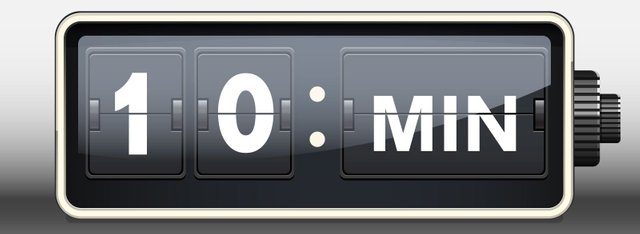10 minutes to greatness

Why 10-minute microtasks could be your new best friend
Years ago when I had two good Achilles I used to run for fun and train for events. I often found it hard to get out of my warm and comfy bed when it was dark and chilly at 6 am.
So I'd tell myself that I only had to go for a short run around the block. Just 10 minutes, I'd say.
But of course once I was dressed, had laced up my shoes and was trotting down the road, it was never ever going to be for just 10 minutes, was it? That 'just 10 minutes' I dangled in front of my sleepy self was enough of a carrot that saw me clocking up the miles I needed.
'Just for 10 minutes' is the sort of lie we tell ourselves when willpower and motivation are on hiatus. And this is why I'm trotting out the 10-minute microtask mindset again, but this time it's to trick myself into relaxing, enjoying downtime and exploring hobbies.
Learning to switch off
Work consumes my life. It's not just the hours I spend working on a project during the day or writing blog posts like this after hours or spending time on my other digital projects, it's the brain space I give to all of these things every other minute of the day. I feel like I never truly switch off from work.

There are things I want to do and achieve in life besides work work work. I often wonder what other people do of an evening or weekend. What do you do when you're not at work? I'm truly curious and would love to know.
Here are some things I want to do:
- learn to speak Korean proficiently
- learn new songs on the piano and learn to compose music
- meditate every day
- read a book each week
- finish writing my first novel
- go hiking more often.
The only one of these things I'm doing with regularity is reading. The rest, even meditation, seem like hard work. So that's why I'm dangling that 10-minutes carrot again. Just ten minutes of Korean study. But of course, once I'm into it, it's never going to be just 10 minutes. Same with writing or playing the piano.
How to get good at something
When we think about becoming expert at something, we often think of fields like music, language acquisition or a sport.
You might have also heard that it will take us 10,000 hours to reach expert-level excellence in our field. 10,000 hours is the equivalent of 5 full-time years of practising for 40 hours per week to perfect your craft or skill.
Spend 30 minutes a day practising and it will take you 50 years to reach 9125 hours and still a long way from that elusive 10,000 hours.
Spend 1 hour per day practising and it will take you 25 years to reach 9125, but up that to 2 hours per day and you'll reach 10,950 hours in 15 years. Hooray?
But here's the thing we don't actually need to spend 10,000 hours to become really good at something. That's a myth!
Where the 10,000 hour myth originated
When psychologist K. Anders Ericsson conducted the original study, he studied expert-level musicians, athletes and chess grandmasters who were experts in ultra-competitive fields. What he found was the more time these elite-level practitioners spent developing their skills, the better they performed. The people at the top of their fields had spent about 10,000 hours practising and refining their skills.
But the true meaning of that research has diluted over the years until it got to the point where what we're hearing is that it takes 10,000 hours to learn anything.
When it comes to skill acquisition, research says that people get good at things with just a little bit of practice. We can go from grossly incompetent at a skill to knowing how to do it in a short period of time.
Learning a skill can be broken down into learning a series of micro skills. Think about a chef. They learn to use different types of knives to cut, chop, dice and slice different types of food. Each food and knife type is a different micro-skill they acquire that all adds up to a lot of badass cheffing.
20 hours to a new skill
In his TED Talk 'How to Learn Anything', Josh Kaufman boldly declares that you can go from knowing nothing to being astounded by how good you are with only 20 hours of deliberate and focused practice. This equates to roughly 45 minutes per day for a month, even allowing for a few skipped days.
How to 'practise' intelligently
1. Deconstruct the skill
Decide exactly what you want to do and then break it down into smaller pieces. The more you can break a skill down, the more you can decide what the most important skills are that will help you learn what you want to learn and then practice those skills first.
2. Learn just enough so you can self-correct
Gather the resources you need, but get swallowed into the vortex of over-gathering (aka procrastination).
After some initial practice, your learning becomes a little better so you notice when you make a mistake and you can try something different.
3. Remove barriers to practice
This is also known as removing distractions, whatever they are to you. For me, it's social media and sometimes my family.
When I want to focus on work, I use a Chrome plugin called Work Mode to block social media. If I forget about my self-imposed social media ban and try and open Facebook, my browser immediately shuts it down. I also shut down email when I'm in work mode. Figure out what you need to do remove distractions.
4. Commit to practice for at least 20 hours
Because most skills have a frustration barrier, by pre-committing to 20 hours you'll be able to stick with the practice to see skill improvement.
10 minutes to greatness

I'm ready to give this a go and commit to spending 20 hours over the next month learning Korean.
45 minutes a day seems like a big chunk of time right now. Even 30 minutes is daunting. So that's why I'm going to tell myself I only have to study for 10 minutes. It'll be like putting on a pair of metaphorical runners and once those runners are on, there's no way I'll stop at learning to conjugate just one verb, right?
How about you? Is there a skill you've put off learning because it seems too hard? Do you think you could try Josh Kaufman's theory of 20 hours? Let me know in the comments below.
Posted from my blog.